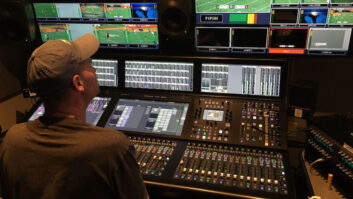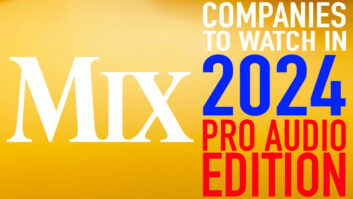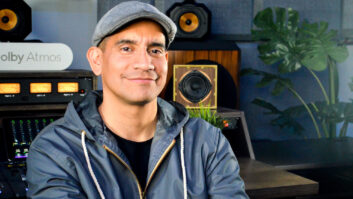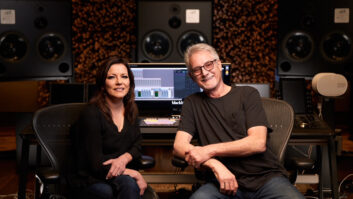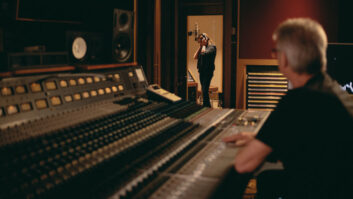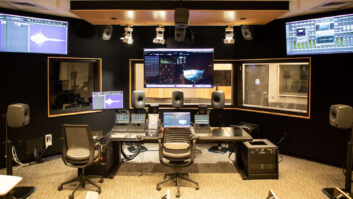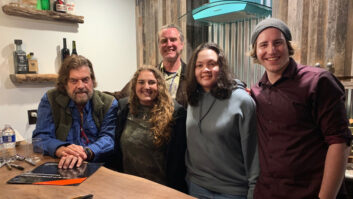If there’s one thing that most members of the recording industry will agree upon, it’s that when it comes to getting an education, there is no fail-safe plan or path to take. With as many factors that can contribute to a person’s success post-graduation, becoming well-educated, employable and eventually well-established is something only the student can control. There are now nearly 200 programs available in the U.S. and Canada of varying lengths and emphasis; audio students have few excuses not to find the location, coursework or level of education that fits.
Recording schools have emerged as the de facto entry point to the industry. The older mentor/assistant model of learning — where an engineer takes on assistants and teaches them skills and etiquette hands-on until they get their first break — is rarely employed anymore. As Full Sail’s Recording Arts department head Bill Smith recalls, “What I was able to do by hanging around and learning would take a lot longer if you tried doing that today. People are much busier and there just isn’t time to sit with somebody and devote an hour or two to them every day. Employers expect people to walk in the door and be competent.”
Developing technologies, a wider variety of available careers, the closure of large studios and new independent business models have redefined the way new engineers are educated. Students can become prepared through Web-based courses, shorter-duration trade school programs, four-year university programs and conservatory programs. For those who want to take it to the next level, select programs, such as University of Massachusetts Lowell’s Master’s in Sound Recording, offer advanced degrees.
Regardless of program style, most recording arts students are training for a very different, more broad-based audio world than in the past, one that Columbia College Chicago’s Benj Kanters, a professor in the Audio Arts & Acoustics department, finds himself regularly educating students and their parents about. Says Kanters, “The need for engineers is still there, it’s just not in studios anymore. It’s in the production offices of the jingle companies, the ad agencies, the post-production houses, the Web authoring services, the CD-ROM publishers. The job market is just sprayed out across the landscape. The jobs just don’t exist in their traditional forms.”
LEARNING TO LEARN
With more career options than ever and a constantly changing technical environment, university-level programs have become increasingly important. As AES president Theresa Leonard notes, “A well-rounded education is important. It provides a young engineer the opportunity to be mobile within the industry.”
While new technologies have influenced the way a curriculum develops, educating students about core skills is still pertinent, as Berklee College of Music professor Stephen Webber explains. “The way that records are made, and the industry itself, is going through a reconstruction. Learning to adapt to change and looking around the corner [are essential]. At the same time, there are a lot of core values in the way that records have been made that are also important: having a direction, a vision, a good work ethic, really good organizational skills and documentation habits.”
Dr. John Shirley, associate professor of Sound Recording Technology at the University of Massachusetts Lowell, says, “The main movement toward a shorter-term, application-specific education may seem to generate faster results on a limited scale, [but] it is actually a shortcut that hurts students in the end. To be successful in this field, you must know why you are pushing certain buttons. Understanding signal flow, quality factors, acoustics, recording and mixing techniques are paramount.”
For four-year programs such as those in the Audio Arts & Acoustics department at Columbia College Chicago, a liberal arts education allows students to learn how to learn. Kanters says, “We found that we needed to arm the student with as broad a base of knowledge about the theory of audio, the theory of sound and the many ways in which audio can be crafted. We’re teaching them critical audio thinking, creative thinking, flexibility — there is no rule of thumb anymore.”
Time is also on the side of university programs, contend its advocates, including UMass Lowell faculty member Alex Case, who lists a university’s program duration as one of the few distinguishing factors between it and a trade school’s curriculum. “We’re not just teaching a piece of equipment or a piece of software,” he says. “Because we have a little more time to spend, we can talk about a range of boxes — including ones not yet invented — more generally and equip students to take on each box that comes out.”
TOOLS OF THE TRADE 24/7
Trade school programs are aware that the environment and shortened timeframe in which its students must learn is not for everyone. Full Sail’s Smith acknowledges, “We offer accelerated programs for those who are focused on what they want to do and are suited for the immersive environment. If someone wants to take a slower approach, a four-year program may be better.”
Still, trade schools can provide the necessary technical know-how, creative learning environment and flexible schedule. In general, trade school programs comprise practical applications and equipment-use classes, but general education coursework has recently been added to many facilities’ programs.
One such trade school is Full Sail (Orlando, Fla.), which offers a one-year Associate’s degree in Recording Arts, with the opportunity to continue an additional nine months to recive a Bachelor’s of Science in Entertainment Business. Both analog and digital gear are used in class, and Recording Arts classes are 50 percent hands-on, 50 percent lab-based. Of the school’s day-to-day teaching philosophy, Smith says, “Our students are in school on average between 36 and 48 hours a week. We’re open 24 hours a day, seven days a week. Our program is structured so that while first learning what the knobs and basic functions are, the student is at a station by themselves with the equipment so they can work at their own pace. It’s not until later in the program that we put them in a studio environment to put those skills to work.”
GREAT EXPECTATIONS
Balancing the creative and the technical, audio education programs today can be as unique as each student and will continue to evolve: Columbia College Chicago now offers sound reinforcement and post-production curriculums; Ex’Pression offers Web design and animation; Full Sail students can focus on sound for film.
Berklee’s Webber concludes, “[Students have] a lot to learn, and having a good sense of where you want to go certainly helps. Being open to new ideas and learning throughout the rest of your life is key. Hopefully, we just whet a student’s appetite for learning. If we can foster in them the love of doing that, then I think we’ve done our jobs.”
IT STARTS WITH MUSIC
While technical training is key, nearly all educators and engineers stress that you cannot overemphasize the benefits of a music background. Among the purists in the business, renowned engineer Bruce Swedien believes that some of the essential skills an engineer can learn take place outside the studio and classroom. An advocate of keeping music education in schools, Swedien remembers that, in the ’50s, when his career started, “The goal of recording was to present an unaltered acoustic event. And the problem [with that] to me was that it left the most important thing out of the music that I was recording: my imagination.”
Working with such talent as Duke Ellington, Count Basie and Michael Jackson, Swedien developed a “sonic personality,” a step that he advises young engineers to do. To take that step up from technical competence to develop a signature sound, Swedien emphasizes that students need to listen to music in the right environment, one that is acoustically supported. “A lot of young people try to go into the music recording industry without really knowing what good music sounds like,” he says. “I hook [my interns] up with Carnegie Hall and start them going on a regular basis. Music is conceived to be heard with acoustic support of some sort. That doesn’t necessarily mean lots of reverb or echo.
“In addition, you can’t learn how to make unique recordings by listening to other people’s records. By trying to learn by listening to other folk’s records, you are listening to music with someone else’s idea of what music sounds like, thereby short-cicuiting your own originality. Students have to be able to identify with that and really learn about it long before they think about putting a mic in front of an instrument.”
To quote one of Swedien’s students, Nathan Tharp, who is currently working in an L.A. studio, learning to appreciate music artistically rather than as the sum of its technical parts is essential. He writes to Swedien, “I’ve spent enough years playing with compression, EQ, reverb and effects to really understand how they affect the sound. I used to think that the big picture was the accumulation of all these sounds. However, while listening to you mix, I realized that the big picture is the song and its emotional impact. You’ve given me a deeper insight into my artistic self.”
Breean Lingle is a Mix assistant editor.
GRADUATES SOUND OFF
Who: Jeremy Rogers
Graduated from: University of Miami
Before college, dreamed he would be: a mixer for films
Current aspirations: to become the best sound designer/mixer in Chicago and work on films
Their program was great because: “It has gotten me everything I have. Miami gives you a great base of knowledge of audio, how it works and how we interpret it. Also, you learn how to learn.”
Things he wished he had learned in school: “I would have liked for the mixing and film side of the program to be more aggressive.”
Wise words for future generations of audio professionals: “There are a lot of schools out there. I [recommend you] try to decide what you want out of the program before you choose.”
Who: Doug Tyo
Graduated from: Full Sail
Before college, dreamed the would be: recording bands
Current aspirations: to make a living as a recording engineer and eventually get to the freelance stage in the studios
Their program was great because: “I got all of the basics; especially for internships, they were great. The day after I graduated, I was driving up to start my internship with a big studio. Alumni status applies for the rest of your life.”
Things he wished he had learned in school: “I would have liked to learn music theory and tech support.”
Wise words for future generations of audio professionals: “Choosing the school isn’t as important as getting a good internship.”

